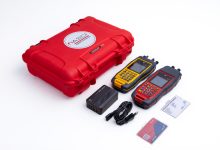As economic pressures and market volatility continue to shape the transport industry, UD Trucks Southern Africa has demonstrated confident, stable growth—supported by disciplined execution, strong retail partnerships and a relentless focus on customer uptime.
These themes came to life at the UD Trucks 2026 Media Engagement, held at Zwartkops Raceway, where media representatives gained first-hand insight into the brand’s strategy, product innovation and customer-centric approach under the theme “Confident, Stable Growth though Volatile Underneath.”
Despite a challenging operating environment marked by rising input costs, fuel volatility and infrastructure pressures, UD Trucks Southern Africa continues to deliver resilient performance, reinforcing customer confidence in the brand’s ability to support long-term business sustainability.
This resilience is reflected in UD Trucks Southern Africa’s strong annual performance. The company achieved an overall new-vehicle market share of 8%, in HD 10.8%, with aggregate industry sales rising to 31 652 units, up from 31 190 units in 2024. The aftermarket business also posted robust growth, with Service Agreement uptake at ~50%, reinforcing long-term customer value, uptime, and operational efficiency—highlighting the company’s stability in a challenging economic climate.”
“While the operating environment remains challenging, our performance shows that customers trust UD Trucks to deliver reliable solutions that support their businesses,” said Filip Van den Heede, Managing Director, UD Trucks Southern Africa. “Our focus remains clear: to drive further for better by offering innovative products, strong retail partnerships and solutions that make a real difference to customer operations.”
Product Innovation Brought to Life on Track
A highlight of the event was a dynamic ride-and-drive session, giving media the opportunity to experience the UD Quon and the Quester in real-world driving conditions. The session reinforced UD Trucks’ philosophy of designing vehicles that deliver measurable performance where it matters most—on the road.
The UD Quon, UD Trucks’ flagship long-haul model, continues to set the benchmark for innovation in the range. Engineered for demanding heavy-duty applications, Quon combines advanced technology, high productivity and superior uptime to support customers operating under intense commercial pressure.
“The Quon represents the pinnacle of UD innovation—from performance and safety to driver comfort and connectivity. It is engineered for customers who demand more from their vehicles,” said Van den Heede.
UD Quester: Built Around What Matters Most
Also showcased was the UD Quester, reflecting the continued evolution of a truck that has played a critical role in UD Trucks’ success across global growth markets. First launched in 2013, Quester has built a strong reputation for efficiency, durability, and versatility across applications, including long haul, general cargo, construction, and waste management.
The truck’s features are driven directly by customer insight, with a clear focus on fuel efficiency, safety, driver comfort, and uptime—key factors influencing total cost of ownership. Key features on the UD Quester 2026 include:
- ESCOT Direct Drive Gearbox, improving fuel efficiency and driving consistency
- 4 Stage Retarder, enhancing braking performance and vehicle control
- UD Stability Control, supporting rollover prevention and directional stability
- Driver airbag, reinforcing occupant safety
- Refreshed cab interior, designed around driver comfort and usability
“Quester is more than a truck—it is a business partner,” said Esaia Taunyane, Sales Director, UD Trucks Southern Africa. “Every feature on the Quester is guided by customer feedback. By improving efficiency, safety, and the driver experience, we help customers reduce the total cost of ownership and achieve stronger long-term returns on their fleet investments.”
With fuel costs accounting for a significant portion of fleet operating expenses, Quester’s engineering—supported by efficient powertrains, intuitive driving support systems, and UD Connected Services—enables customers to extract more kilometers per litre while maintaining performance and reliability.
Uptime as a Strategic Advantage
Uptime remains a cornerstone of UD Trucks Southern Africa’s value proposition. Through proactive maintenance planning, predictive servicing, and rapid breakdown support, the company continues to help customers minimize unplanned downtime and protect productivity.
“Uptime is about anticipation, not reaction,” said Sanjay Naipal, Aftermarket Director, UD Trucks Southern Africa. “By combining proactive maintenance solutions with strong dealer support and connected services, we help customers manage costs, protect productivity, and keep their fleets moving—even in demanding operating conditions.”
Retail Excellence and Global Recognition
UD Trucks Southern Africa continues to invest in its dealer network, recognizing that strong retail environments are critical to customer experience and uptime. Recent milestones include:
The opening of CMH Commercial Pinetown’s new dealership
The McCarthy Commercial Boksburg dealership upgrade, enhancing service capability
A major expansion at McCarthy Commercial Alrode, increasing workshop and parts capacity
Additional facility improvements are underway in Richards Bay, Worcester, Kimberley, Bloemfontein and Port Shepstone.
Dealer excellence was further recognized on the global stage at the 2025 UD Partner Conference in Japan, where South African dealers received multiple awards:
- McCarthy Commercial Alrode – Aftersales Award
- Billson Trucks – Innovation and Sustainability Award
- CMH Commercial – Retail Excellence Award
Better Life in Action: People, Purpose and Community Impact
People remain central to UD Trucks Southern Africa’s long-term sustainability strategy. Continued investment in cadet development, driver training and leadership programs reinforce the company’s commitment to building future-ready skills within the industry.
This commitment was recognized at the NAAMSA Automotive Business Council Awards, reinforcing UD Trucks Southern Africa’s standing within the local automotive sector.
Beyond business, UD Trucks Southern Africa remains committed to meaningful community engagement. In support of Nelson Mandela Day, the company contributed to Sinqobile Primary School in Soshanguve, supporting learner well-being and confidence, and partnered with SOS Children’s Village Mamelodi to provide essential resources for vulnerable children.
“Driving further for better goes beyond our products,” Van den Heede concluded. “It reflects our purpose of creating a better life—for people, for the planet and for sustainable growth. It is about how we support our customers, empower our people and contribute meaningfully to the communities in which we operate.















